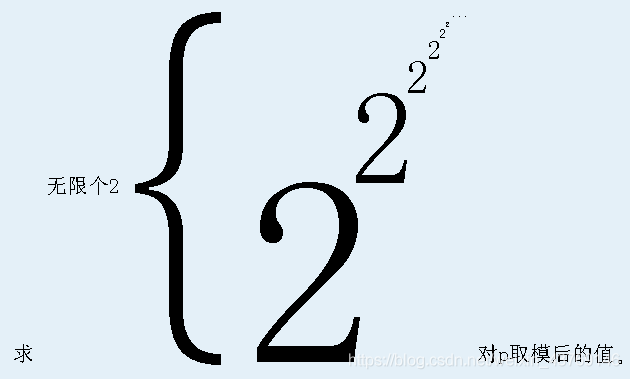降幂算法
欧拉降幂公式
a a ab ≡ a ≡a ≡ab% φ ( p ) φ(p) φ(p)+ φ ( p ) φ(p) φ(p) ( m o d p ) (modp) (modp) ( b > φ ( p ) ) (b>φ(p)) (b>φ(p))
可以把大指数转化成不超过 φ ( p ) φ(p) φ(p)的指数。
注意,这里不要求a,p互质。
注意,这里不要求a,p互质。
注意,这里不要求a,p互质。(重要的事情说三遍!!!)
证明就不说啦,太菜了…
费马小定理
首先p是一个质数, a a ap ≡ a ( m o d p ) ≡a(modp) ≡a(modp)。若gcd(a,p)=1时, a a ap-1 ≡ 1 ( m o d p ) ≡1(modp) ≡1(modp);若gcd(a,p)=p, a a ap-1 ≡ 0 ( m o d p ) ≡0(modp) ≡0(modp)
可以看出费马小定理是欧拉的特殊情况,即p是质数, φ ( p ) = p − 1 。 φ(p)=p-1。 φ(p)=p−1。
传送门:Days passing
题意: 已知当前是周几,求 N M ( 1 < = N < 10 N^M(1<=N<10 NM(1<=N<1010000 , 6 < = M < 10000 , M 是 6 的 整 数 倍 ) ,6<=M<10000,M是6的整数倍) ,6<=M<10000,M是6的整数倍)天后是周几。
解析: 根据费马小定理:7是质数,
如果N是7的倍数, N M N^M NM%7=0,周数不变,
如果N不是7的倍数, N M N^M NM%7=1,周数向前一天。
代码:
#include
传送门:sum
题意: 由1个数,2个数,3个数,…,n个数相加等于N(N为大整数)的不同情况有多少种。
解析: 用挡板法,假设N=3,有:1 1 1,有两个间隙。一个数时不需要加挡板为C(2,0),两个数时加一个挡板为C(2,1),三个数时加两个挡板为C(2,2).那么其实就是求:C(N-1,0)+C(N-1,1)+C(N-1,2)+…+C(N-1,N-1)=2N-1。
答案mod 1e9+7。那么就对N进行大整数模拟取模1e9+6,最后再-1。再用快速幂即的答案。
代码:
#include
传送门:上帝与集合的正确用法
题意:
解析: 考虑欧拉降幂,f(p ) =22%oula(p )+p%p ,f(oula(p ))=22%oula(oula(p ) )+oula(p )%oula(p ),可以看出这是一个递推式,如果直接递推时间复杂度是否可行?
p到oula(p ) =p*(1-p/p1)…*(1-p/pn)。当p是偶数,一定有p1=2,会乘上1/2;当p是奇数,oula(p )一定是偶数,因为它包含奇数质因子1-(1/奇数)会产生偶因子。
代码:
#include